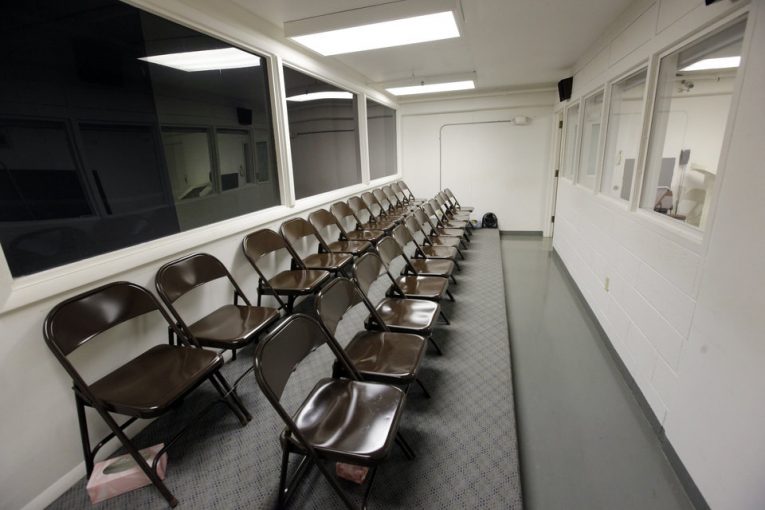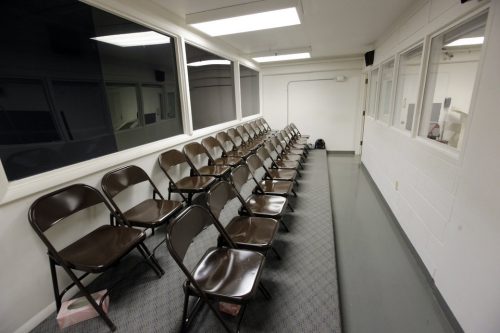

By Naya Wiezel
OKLAHOMA CITY, OK – Benjamin Cole, a death row inmate, was denied clemency by the OK Pardon and Parole Board this week, despite substantial evidence of both severe mental illness and physical disabilities, claim his lawyers.
Cole was convicted for killing his nine-month-old daughter in 2002. Cole is set for execution on Oct. 20.
The evidence provided by his defense suggests Cole is in no condition to be a threat to anybody, due to his feeble nature.
However, a decision on whether to hold a competency trial for Cole will be given by a Pittsburgh County judge this Friday, Sept. 30.
Tom Hird, an attorney representing Cole, said his client is “so impaired that he does not rationally understand why the State intends to execute him and was unable to participate in the clemency proceedings.”
Cole’s lawyers claim Cole has struggled with paranoid schizophrenia, as well as having displayed signs of Parkinson’s disease for decades, and also struggles with the ability to move around, is reluctant to communicate with others, and is unable to practice basic hygiene.
Cole’s team of attorneys sought the assistance of the Pittsburgh County Court on Aug. 15 of this year.
Jim Farris, the warden of the Oklahoma State Penitentiary where Cole is being held, denied the attorney’s request for competency proceedings, despite the mountain of evidence of Cole’s condition provided by experts, and Oklahoma law which mandates immediate competency proceedings when a prisoner is “believed to be insane.”
Supporting briefs published amid this trial, said Cole’s defense, demonstrate that his condition has long been a concern, beginning at the time of his trial in 2004. Throughout his trial, his physical and mental impairments made it extremely difficult for his attorneys to connect with him and work with him.
The lawyers argue Cole has displayed incoherent thinking and communication for many years now, which can be attributed to the evidence of brain damage found in an area associated with schizophrenia.
Dr. David G. Hough has been a leader in the evaluations of Cole, and reiterated a 2016 finding that Cole was unfit to be executed. According to Dr. Hough, Cole was unable to coherently communicate during these evaluations, and he was in a state of immobility and an unkempt nature.
Additionally, a case manager for Cole said she was unable to communicate with Cole for three months.
Dr. Hough said, “Mr. Cole’s current clinical presentation is consistent with his diagnosis of severe and chronic schizophrenia with catatonia, as well as MRI-documented organic brain damage. He continues to meet criteria for severe and persistent mental illness.”
The mandamus petition, filed by Cole’s attorneys, illustrates the warden’s refusal to initiate competency proceedings, based on the findings of another evaluator, Dr. Scott Orth. The attorneys and Dr. Hough argued in this petition that the evaluation made by Dr. Orth is highly unreliable.
According to the documentation, Dr. Orth concluded that Cole was not displaying any mental impairments, and claimed that Cole was able to communicate with him coherently.
Dr. Hough contests this evaluation, said the defense, because Dr. Orth never provided any physical evidence of his interaction with Cole. Without any audio or visual evidence to support Dr. Orth’s findings, Cole’s team argues it is not enough to warrant a denial of competency proceedings, and the conflicting findings of the two doctors are grounds enough to initiate the proceedings.
In addition to the mandamus petition, the defense also filed two more motions: a request for an evidentiary hearing and a request to assist the experts’ access to Cole.
The mandamus petition is available here, as well as the brief supporting the petition here.
